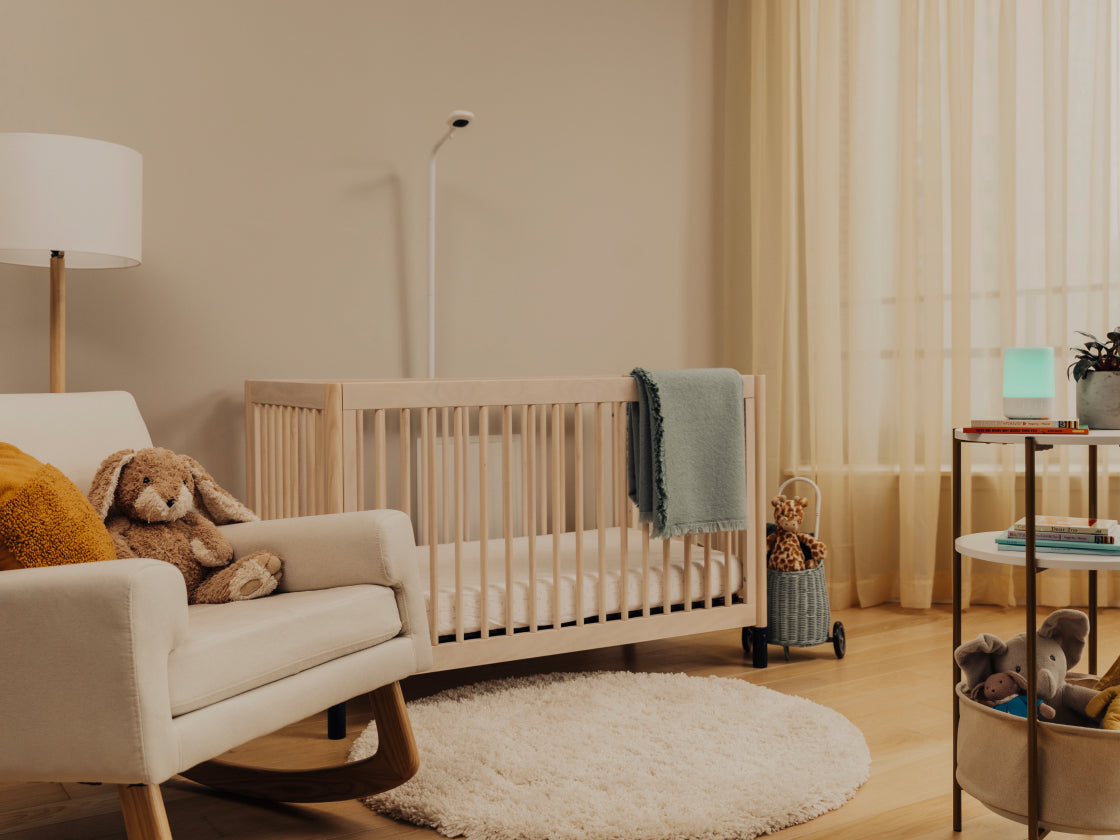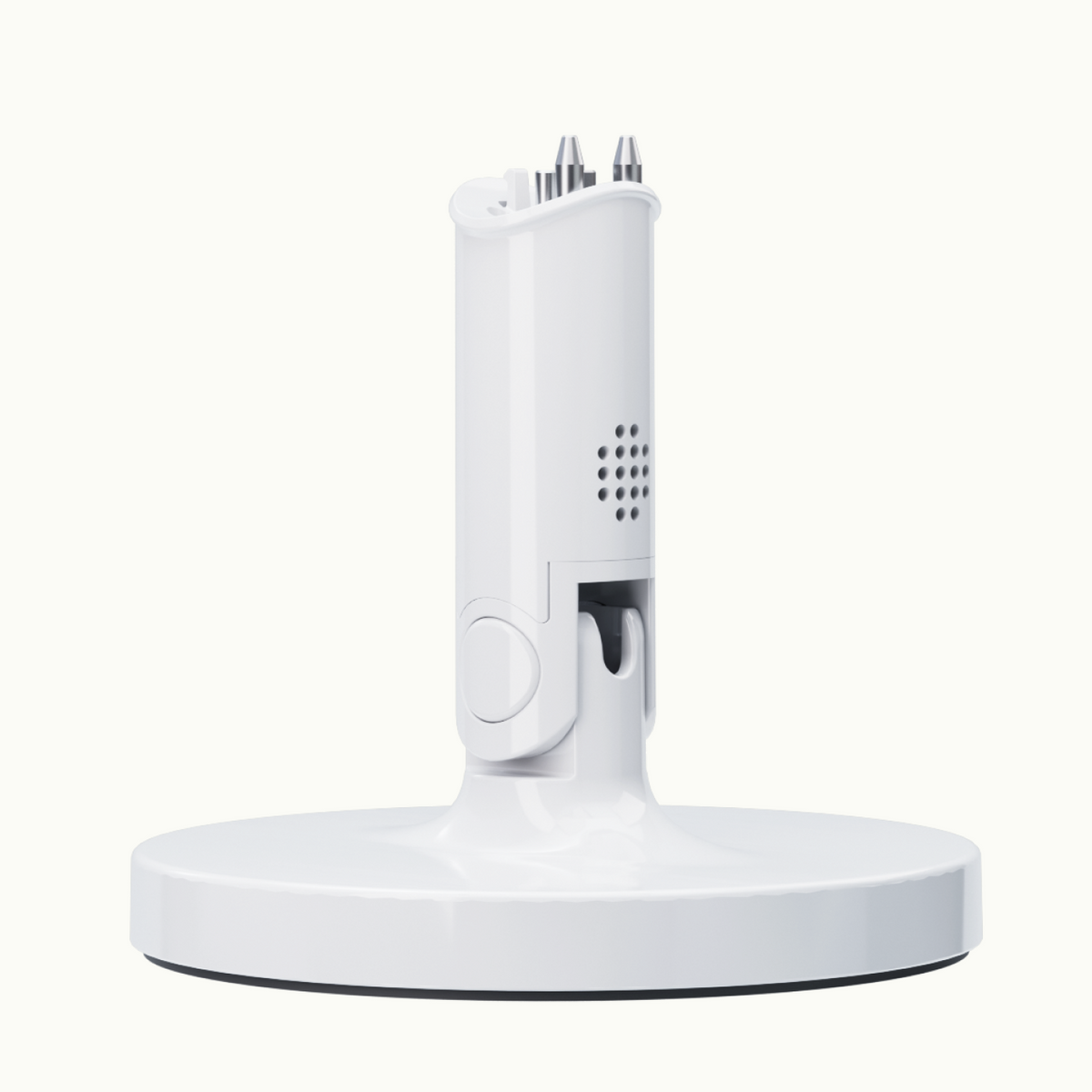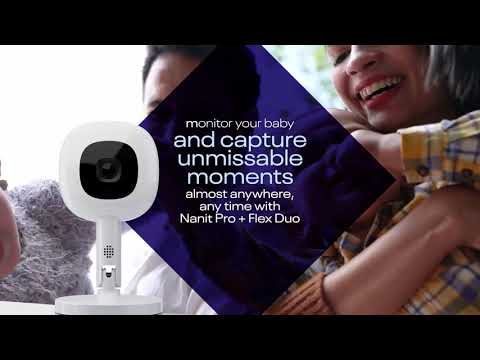Whether your baby is brand new or heading into toddlerhood, they’re changing in so many ways. And Nanit is right along with you for every step..or wiggle…of the journey. From the moment you bring your baby home from the hospital to the time they move into their first big kid bed and beyond, Nanit monitors keep parents company and provide vital insights and information that help you do the important work of keeping your baby happy, healthy, safe and as well rested as possible. (You too, while we’re at it!)
Knowing what to expect is a big part of working through the parenting puzzle, letting you troubleshoot issues with greater confidence and sometimes, before they even come up. So as a resource for the months to come, here’s what to look forward to—and watch out for—as your baby grows:
0 to 3 months
Milestones: Babies are starting to: gain more control of their arms and legs, cry for more than one need, hold up their head without help, show interest in objects and people.
What to Watch Out For: Their sleep schedule at this stage is all over the place; do whatever you need to keep them happy and comfortable or get them to sleep. It can be helpful to establish a short bedtime routine at this stage to help set the scene for sleep.
Newborns are also capable of rolling! It’s probably more of an accident at this age than a sign that they’re a developmental genius. But it’s good to be aware of the possibility so you keep your baby safe. When you put your baby down on a surface, always keep at least one hand on them. If you have to walk away, make sure they’re in a safe location on the floor or in a bassinet or crib.
How Nanit Can Help: Use Nanit’s Pro Camera Monitor for peace of mind while you sleep. Watch your baby from anywhere using the Nanit App, on the web at my.nanit.com, or through your Google Home/Alexa smart home device. With Night Mode, you can dim the app and keep the stream open on your device all night without disturbing your sleep. Or, use the background audio feature to hear them even when your phone screen is off.

The Floor Stand is a great choice for monitoring, as it can be set at a lower height to accommodate the size of the bassinet. Nanit’s Flex Stand is also bassinet compatible (Flex doesn’t offer sleep insights, but parents can still monitor, get notifications, and activate Breathing Motion Monitoring).
The Nanit App offers a huge range of alerts that will grow with you. At this stage, you may want to customize your motion and sound notifications, or turn on smart alerts including cry detection and temperature and humidity (if your baby’s room goes outside a certain range).

This is also a great time to start using Nanit’s sensor-free Breathing Wear, which monitors your baby’s breathing motion and sends real-time alerts should your little one need you–so you can catch a breath. The custom pattern works with the Pro Camera’s patented computer vision technology to safely detect your baby’s breathing motion in almost any sleep position–without sensors, electronics, or radars. The Breathing Wear Swaddle is a great choice for back-sleeping newborns who need extra soothing and comfort.
In addition to monitoring capabilities, the App dashboard allows you to track your little one’s sleep behaviors and more. Nanit’s Sleep Status feature also lets you know the last time your baby fell asleep so you don’t have to rely on your foggy memory. Using Nanit’s dashboard, you can also stay up to speed on their sleep metrics and see how it changes over time.
You can also use advanced analytics to track their head position preference at night–many babies will favor resting their head on one side or the other. Spending time in all positions, along with supervised tummy time during the day, can help the development of your baby’s neck muscles.
To guide you through each stage, the app offers age-related tips through the first two years across a range of topics from development to feeding, parenting, and more. And to mark all the can’t-miss memories, Nanit’s algorithm detects and saves special moments like morning pickups and anniversaries. Plus, upgrade to a Memories or Milestones Insights Plan for Nanit to start auto-capturing Watch Them Grow compilations–you’ll be able to look back on how much they grow in just a few months!
Don’t forget to add your caregiving village to the app so they can help from the start. User permissions let you control what they have access to, with the option to limit to Local Wifi-Only Access (great for babysitters!).
3 to 6 months
Milestones: Babies are starting to: Sit upright, put more objects in mouth, roll over, make more sounds and react to noises and music. Show emotions.
What to Watch Out For: Your baby’s probably starting to outgrow their bassinet right around now. To a little one, transitioning them to a crib can be a big change (it’s so much bigger! And smells different! And Mom and Dad are farther away!) Here are some tips to help:
- Start slow. Naps are a great way to ease your baby into their crib. Instead of giving the bassinet up all at once, start putting your baby down for naps in the crib (but still spending nights in their more familiar bed). As the crib becomes more and more comfortable for them, let it become the bed go to.
- Establish a consistent bedtime routine. For example, bath, singing, book, then into bed. When your baby grows used to a regular series of nighttime events—and when those stay the same even if the physical bed changes—the difference of sleeping location will feel less jarring.
- Be firm. A firm mattress is safer for your baby than a soft, squishy one. And put your baby in a sleep sack or cozy pajamas instead of using loose blankets which are not recommended in the first year.
How Nanit Can Help:
For many families, a lot changes in this stage as little ones move to a crib in their own room and start learning to sleep independently. And as your baby reaches the milestone of transitioning from a bassinet to a crib, Nanit’s adjustable-height Floor Stand transitions too, starting at a lower height for the bassinet, and extending higher to complement a taller crib.
Having the ability to track all your baby’s sleep details is a huge, helpful part of the crib transition process. Nanit monitors offer sleep and wellness data (so accurate it’s used as a research tool!) such as how long your baby sleeps, how often they wake up and for how long, and how efficient their sleep was. This kind of information helps you establish your child’s sleep patterns and behaviors so you can plan for bedtimes and naps, talk about changes with your pediatrician, and be in the know with their milestones (see the next section). Starting at 4 months, you’ll also get personalized tips based on your baby’s real sleep data–it’s like having a sleep expert at your fingertips to help your baby (and you!) sleep better.

As your little one is learning to sleep independently, you may choose to decrease the sensitivity of your motion + sound alerts, or swap them out with cry detection alerts if you don’t want to be notified of every grunt during naptime.
When your baby starts showing signs of rolling, you should also graduate them from a swaddle to a new Breathing Wear style to continue to monitor their breathing motion. The Sleeping Bag or Pajamas are great choices, or you can layer the Breathing Band over Sleep Wear Pajamas.
Speaking of rolling, you can also track their body position and activity score during sleep in the Dashboard. You may notice changes in their crib behaviors as they are practicing new moves. With Developmental Milestones capture, Nanit will record and share their big firsts as they happen in the crib (like rolling over and sitting up)! And for parents who want to look back at every adorable (or silly) moment in the nursery, you’ll be able to see from two full days of Video History (Memories plan) to seven days (Milestones plan).
Along with a regular bedtime routine, white noise, like from Nanit’s Sound + Light audio monitor, can provide a soothing constant as your baby goes to sleep. Studies have also shown that white noise in the nursery helps babies sleep better and longer than those without it.
6 months to 1 year
Milestones: Babies are starting to: Crawl and stand without assistance, may start walking, grab objects with one hand and drop them, know name, recognize other objects by name and follow simple instructions, might cling more, like to give hugs, and explore solid foods.
What to Watch Out For: As babies start to move around more—crawling and walking—babyproof where you live with protections like gates blocking off stairwells, adding padded protectors on coffee table corners, drawer latches and the like. It’s also good to get cords organized and out of the way so they don’t end up in curious hands or mouths.
How Nanit Can Help: Research has shown that if your baby suddenly starts waking up more often or is active at night, it can be a sign that they’re approaching a major motor milestone (like crawling or pulling up to stand). Infants’ brains will sometimes get fired up with all the new information they’re processing, keeping them in lighter stages of sleep, or they may spend time “practicing” the new movements they’re learning. So if your Nanit Insights reveal a sudden change in your baby’s nighttime wakeups or their Activity Score is up, be on the lookout for exciting developmental progress. Should a milestone happen when your baby is in the crib, rest assured that you won’t miss it! For Milestones Plan members, Nanit automatically captures videos of your little one achieving Developmental Milestones, plus compilation videos of your baby mastering the skills they’ve been practicing.
Also, Nanit monitors offer two-way audio features so you can comfort and connect with your baby during wakeups without necessarily needing to visit the crib. Another way to save unnecessary room visits? The Baby Standing alert. With its help, you’ll know for sure that yes, naptime is truly over.
1+ years
Milestones: Little ones are starting to: Say words, clap, feed themselves, stack objects, copy other children while playing, walk more steadily and/or take more steps.
What to Watch Out For: Baby’s really moving now. One of the most important safety steps to take around your home (and other places your baby visits often like a grandparent’s house) is to anchor heavy furniture so that, should your baby decide to climb that bookshelf or those open dresser drawers, nothing tips over or falls on your child. This may also be the time when your baby starts to climb out of the crib.
How Nanit Can Help: To stay ahead of your little crib escape artist, the Nanit App offers a Baby Standing notification. Rest assured, there’s no rush to move them out of their crib and into a toddler bed even if they do start showing signs of crawling out of bed–just make sure their room is a safe space for them should they go exploring.
The Flex Stand is also useful around the house or on the go, with the Alert Zone feature: Should your little one enter an off-limits zone, you’ll be notified. As your child gets older, you can continue to adjust your Nanit notification settings, turning off or lowering the sensitivity of some alerts (such as motion and sound) so you’re only alerted when your baby truly needs you.
At bedtime, some toddlers may start to be afraid of the dark, so using a friendly night light might help them through it.
Insights users with Memories and Milestones plans may have added clues as to just what your little one gets up to in the crib (as well as the sweet moments in between) with two to seven full days of Video History available depending on the plan.
Above all, we want parents to know that as your baby grows, Nanit grows right along with them, providing connection, sleep and breathing info and tips, useful data about milestones and more, sweet memories, and resources to support every stage. It’s an amazing journey, this parenting one, and we’re here to help your whole family get the most out of every moment.



